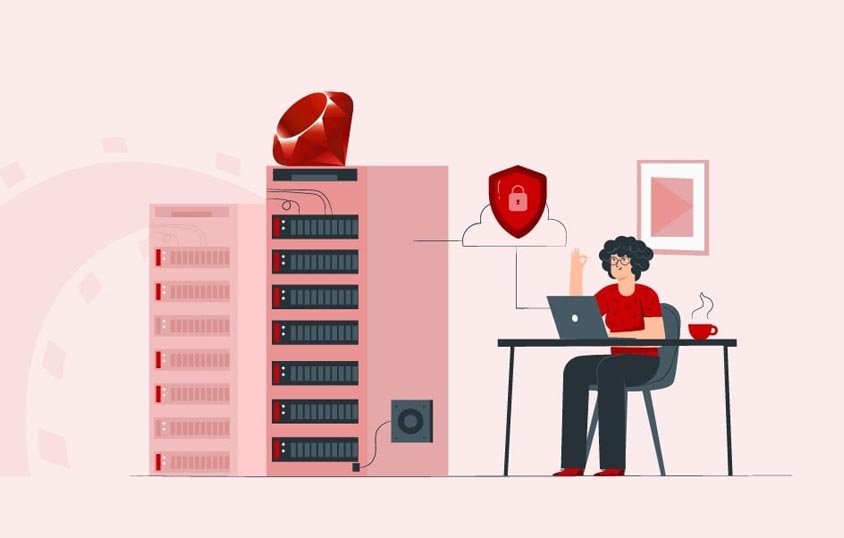Content
Recent Posts
Best Ruby on Rails Hosting Providers

Building a Ruby on Rails app is exciting because the Rails framework helps you move quickly from idea to production. But once your application code is ready, you need a reliable place to run it. Your hosting choice affects how fast your site feels, how much downtime you face, and how easily you can grow. In this guide, you will learn what Ruby on Rails hosting means, what to look for in a provider, and which companies stand out in 2026. By the end, you will have a clear picture of the hosts that fit different budgets and technical needs for building web applications and long-term web development success.
Content
What Is Ruby on Rails Hosting?
Ruby on Rails, often called Rails, is an open-source web application framework built on the Ruby programming language. It follows the Model–View–Controller (MVC) pattern, which helps you organize code and separate business logic from user interfaces. Rails comes with a rich set of built-in tools for database management, routing, and testing, allowing you to build complex Rails applications faster and with cleaner code. Its “convention over configuration” approach means you can spend less time on setup and more time adding new features.
Ruby on Rails hosting is more than a standard web server. A Rails app requires a hosting environment that supports key components such as:
- Ruby runtime
- Compatible web server (Puma or Passenger)
- A database such as PostgreSQL
- Background job system like Sidekiq
- SSL certificates and caching layers
A good provider makes these elements work together so you can focus on writing code instead of managing servers. Many also provide extensive documentation and tutorials to guide your deployment process and reduce security risks.
When a host is designed with Rails in mind, you can deploy updates with a simple command, scale up resources during traffic spikes, and count on reliable backups and timely security updates. Without these features, you may spend more time fixing server issues than improving your app.

Key Factors to Consider
To choose the right hosting provider, you need to consider scalability and ease of deployment. Strong providers typically offer:
- Fast page loads and optimal performance
- Managed databases and Redis caching
- Tools for continuous deployment
- Uptime guarantees and automated backups
- Built-in security features and regular security updates
Pricing also matters. A host that looks cheap at first may become expensive as your database or traffic grows, so check how usage charges increase as you scale.
Leading Ruby on Rails Hosting Providers
Several companies have earned a strong reputation for Rails hosting in 2026. Each offers different balances of price, control, and convenience, so the right choice depends on your needs.
Render
Render provides a platform-as-a-service experience similar to Heroku but with more flexible pricing and modern features. They support background workers, manage PostgreSQL databases, and automate deployments. Developers often highlight Render’s predictable pricing, customization options and clear interface as major advantages. This provider is a good option if you want the simplicity of a managed platform without paying top-tier rates.
Fly.io
Fly.io focuses on global performance by running your app closer to your users. Their edge servers reduce latency and deliver fast responses and high performance around the world. Benchmarks show Fly.io outperforming Heroku and Render in speed tests. They also offer granular resource options and compliance features like SOC2. Setup requires more technical effort, but you gain fine control and excellent performance.
Heroku
Heroku remains one of the easiest ways to deploy a Rails app. You can push your code with a single Git command and rely on their ecosystem of add-ons for databases, caching, and monitoring. Their extensive customer support, strong email alerts, documentation, and community support make it easy to get started. The trade-off is cost: pricing climbs quickly as you add dynos, database storage, and background workers, and free plans come with limitations.

DigitalOcean
DigitalOcean gives you a choice between fully managed App Platform hosting and raw VPS servers called Droplets. With App Platform, you get automated deployments and scaling, while Droplets offer more control at a lower starting price. Global data centers, predictable billing, and an active community make DigitalOcean an excellent choice for developers who want flexibility without enterprise complexity.
Linode VPS
Linode VPS hosting gives you complete control over your environment. You can configure the server exactly as you like, install the latest Ruby versions, and fine-tune performance. This freedom comes with responsibility, as you handle updates, security patches, and monitoring yourself. If you or your team are comfortable managing Linux servers, a VPS can offer the lowest long-term cost.
Other considerations
Large cloud platforms like AWS and Google Cloud remain options for teams that need enterprise-level scale or specific compliance certifications. These services provide virtually unlimited resources but also require significant configuration and ongoing management. Smaller managed Rails hosts may also appeal if you want dedicated Rails support and security at a specialized scale.
Choosing the Right Host for Your Needs
Your decision should match both your current project and future growth. If you value quick deployment and minimal server management, a managed platform like Render or Heroku is ideal. If global speed is critical, Fly.io offers edge servers that keep response times low. Developers who want more control with balanced pricing may prefer DigitalOcean’s App Platform or a VPS. Those with strong DevOps skills and a tight budget often pick Linode or other VPS providers to fine-tune performance.
Think about where you want your app to be in a year. If you expect rapid growth or need advanced compliance, you may benefit from starting with a provider that scales easily, even if the entry cost is higher.

Final Thoughts on Choosing Your Rails Host
The best Ruby on Rails hosting providers combine reliable infrastructure with tools that let you focus on development. Providers such as Render, Fly.io, Heroku, DigitalOcean, and Linode each offer a different balance of cost, performance, and control. By considering your budget, expected traffic, technical comfort, and growth plans, you can choose a host that keeps your Rails app running smoothly and leaves you more time to build features users will love. For a broader look at what’s available, explore our full reviews in the web hosting services category, use our comparison tool to view top choices side by side, and browse our educational articles for deeper insights into features and pricing.
Frequently Asked Questions
Can you use shared hosting for a Rails app?
Shared hosting is possible for very small projects, but most shared servers lack the memory and process control that Rails needs. A VPS or managed platform is safer for production apps.
How much does Rails hosting cost?
Entry plans for managed platforms usually start around five to ten dollars per month. Costs rise as you add databases, background workers, or bandwidth. VPS plans can be cheaper but require more technical work with command-line setup and careful monitoring of CPU resources.
Do you need PostgreSQL?
PostgreSQL is the most common and recommended database for Rails apps because of its reliability and rich feature set. Many hosts provide managed Postgres services for easy IP address configuration for remote connections.
How do you deploy updates?
Most managed providers support Git-based deployment. VPS users can use tools like Capistrano or Docker to automate deployments from a remote repository and reduce downtime.